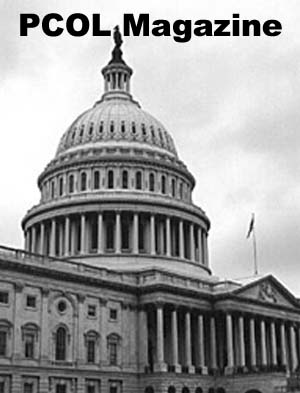
Where the Appropriations Bills stand now
GOP Friction Fouls Action on Agencies' Funding As Turkey-Dinner Time and Adjournment Near
By Dan Morgan
Washington Post Staff Writer
Monday, November 10, 2003; Page A23
Republican control of the White House and Congress this year hasn't ended one Washington fall tradition that is as predictable as Thanksgiving turkey.
Many of the 13 annual bills needed to fund government departments and agencies through next September are hung up in money and policy wrangles, forcing much of the federal establishment to operate under temporary measures known as "continuing resolutions."
Democrats are on the fringes of these battles. The disputes are mainly between Republicans in the House and Senate, or in some cases between the White House and GOP lawmakers.
For example, despite a White House veto threat, some GOP lawmakers in both houses want to use the bill funding the Commerce Department to revise media ownership rules announced earlier this year by the Federal Communications Commission. GOP leaders, fearing further amendments, have yet to bring the bill to the Senate floor.
House and Senate negotiators, meanwhile, are at odds over vouchers for D.C. schoolchildren, proposed Labor Department rules making it easier for employers to deny overtime to white-collar employees and "country of origin" labeling for meat products sold in supermarkets.
There are also internal GOP disagreements over the level of spending for education programs, loans for expanding broadband service in rural areas and the modernization of local election systems.
Only three of the 13 bills have been signed into law. A fourth is on its way to the White House. The nine others are at various points of the legislative pipeline.
"I'm hopeful there's a way out of here before Thanksgiving," said John Scofield, spokesman for the House Appropriations Committee, in what some regard as an overly upbeat assessment.
Senate Appropriations Committee Chairman Ted Stevens (R-Alaska) was asked if these and other roadblocks would prevent completion of the fiscal 2004 appropriations process by Nov. 21 and lead to a January or full-year CR, as some have floated. Congress Daily reported that Stevens responded: "I don't think it's a real threat. We can get it done and get out of here by the 21st. We'll find a way to get the work done."
Republican tempers have begun to fray a bit.
Tourists gazing at sublime paintings of great moments in American history in the Capitol Rotunda last week suddenly were taken aback by raised voices. It turned out the men having the conversation were Scott B. Palmer, chief of staff for House Speaker J. Dennis Hastert (R-Ill.), and James W. Dyer, staff director of the House Appropriations Committee.
The heated topic, sources said, was the possibility of an end-of-session "omnibus" appropriations bill that would wrap all the unfinished bills into one mammoth package. Congress would vote on the measure with no opportunity for amendments.
GOP leaders like the idea because, in close consultation with the administration, they could simply take charge of the process, impose their solutions and then challenge their members to vote against a huge bill stuffed with money for local community projects, road building, schools, waterways and harbors.
But given the passions aroused by some of the outstanding issues, members and aides on the appropriations committees have expressed concern that an omnibus bill might not muster enough GOP votes to pass the House and could face a filibuster in the closely divided Senate.
Democrats are worried that the GOP high command in the House and Senate will use such a measure to attach pro-business provisions opposed by environmental organizations, consumers and labor groups.
"You might as well not bother to even keep track of these bills because the GOP leadership is going to do what it wants in the end anyway," a House Democratic aide said.
Democrats point to the $20 billion bill funding the Interior Department, which Congress sent to the White House last week, as an example of the GOP's use of spending legislation to influence court decisions unfavorable to environmentalists and others.
One provision delays for 15 months a federal court decision ordering the Interior Department to make a full accounting of royalties and fees owed to Indian tribes for oil, gas, timber and grazing on their land. Lobbyists for Briggs & Stratton, a Milwaukee lawn mower and outdoor engine manufacturer, plan to push for a provision in a pending bill funding the Environmental Protection Agency. The rider, sponsored by Sen. Christopher S. Bond (R-Mo.), would require such small engines to meet only EPA emission standards rather than more stringent ones recently announced by California.
With many bills in play, including a far-reaching energy bill and reform of Medicare, Republicans are also quietly using the spending bills to embark on new initiatives.
House and Senate negotiators last week completed work on a $27.3 billion energy and water bill that provides $13.5 million for research on a new kind of nuclear weapon, known as the Robust Nuclear Earth Penetrator, or bunker buster.
"This is a horrible, horrible message to send to the rest of the world," Sen. Dianne Feinstein (D-Calif.) said of the bomb.
THE WEEK AHEAD: The Senate will take up appropriations bills funding the Commerce, Justice, State, Veterans Affairs, and Housing and Urban Development departments. The House will debate the conference report on the Energy and Water Appropriations Act for 2004. It may also consider the conference report on the energy bill (the Energy Policy Act of 2003).
